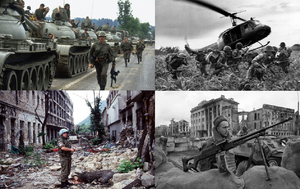Operation Torchbearer: Difference between revisions
No edit summary |
No edit summary |
||
| (3 intermediate revisions by the same user not shown) | |||
| Line 39: | Line 39: | ||
| strength2 = '''Total: X'''<br>{{flagicon image|Flag of Finstria.png}} X | | strength2 = '''Total: X'''<br>{{flagicon image|Flag of Finstria.png}} X | ||
| strength3 = | | strength3 = | ||
| casualties1 = '''Coalition:''' | | casualties1 = '''Coalition:''' 189 killed, 601 wounded<br>{{flagicon|Mascylla}} 189 killed, 601 wounded | ||
| casualties2 = {{flagicon image|Flag of Finstria.png}} X | | casualties2 = {{flagicon image|Flag of Finstria.png}} X | ||
| casualties3 = | | casualties3 = | ||
| Line 46: | Line 46: | ||
}} | }} | ||
'''Operation Torchbearer''' was a multi-state [[Assembly of Nations|AN]]-led coalition military intervention in [[Finstria]] beginning on 4 January 1986. The invasion phase lasted over three months, ending on 10 March, in which a combined force from [[Krumlau]], [[Lavaria]] and [[Mascylla]] invaded Finstria. As a [[Assembly of Nations|peacekeeping mission of the Assembly of Nations]], it was tasked with implementing Assembly of Nations Security Council Resolution 812, in response to events during the [[Finstria|Finstrian insurgency]]: preventing a recurrence of fighting following national violence between the [[Eisenring regime]] and rebellious factions, contributing to the maintenance and restoration of law and order and facilitating a broad return to normal conditions, while also overseeing a political shift of power and the dismantlement of the country's dictatorship | '''Operation Torchbearer''' was a multi-state [[Assembly of Nations|AN]]-led coalition military intervention in [[Finstria]] beginning on 4 January 1986. The invasion phase lasted over three months, ending on 10 March, in which a combined force from [[Krumlau]], [[Lavaria]] and [[Mascylla]], officially referred to as the '''Assembly of Nations Peacekeeping Force in Finstria''' ('''ANPFIF'''), invaded Finstria. As a [[Assembly of Nations|peacekeeping mission of the Assembly of Nations]], it was tasked with implementing Assembly of Nations Security Council Resolution 812, in response to events during the [[Finstria|Finstrian insurgency]]: preventing a recurrence of fighting following national violence between the [[Eisenring regime]] and rebellious factions, contributing to the maintenance and restoration of law and order and facilitating a broad return to normal conditions, while also overseeing a political shift of power and the dismantlement of the country's dictatorship. | ||
[[Category:Finstria]] [[Category:Gaia]] | [[Category:Finstria]] [[Category:Gaia]] | ||
Latest revision as of 12:52, 20 September 2020
| Operation Torchbearer | |||||||
|---|---|---|---|---|---|---|---|
| Part of the Finstrian insurgency (1977–1988) | |||||||
 From left to right: A convoy of tanks of the Mascyllary Army advance towards Schwerarch, Krumlovian troops are deployed by a helicopter, an AN peacekeeping soldier observes the shelled ruins of Thrayn, Finstrian militias protect a toppled checkpoint. | |||||||
| |||||||
| Belligerents | |||||||
|
States enforcing ANSC Resolution 812: |
(Eisenring regime) | ||||||
| Commanders and leaders | |||||||
|
|
| ||||||
| Strength | |||||||
|
Coalition force: 35,000 |
Total: X | ||||||
| Casualties and losses | |||||||
|
Coalition: 189 killed, 601 wounded |
| ||||||
Operation Torchbearer was a multi-state AN-led coalition military intervention in Finstria beginning on 4 January 1986. The invasion phase lasted over three months, ending on 10 March, in which a combined force from Krumlau, Lavaria and Mascylla, officially referred to as the Assembly of Nations Peacekeeping Force in Finstria (ANPFIF), invaded Finstria. As a peacekeeping mission of the Assembly of Nations, it was tasked with implementing Assembly of Nations Security Council Resolution 812, in response to events during the Finstrian insurgency: preventing a recurrence of fighting following national violence between the Eisenring regime and rebellious factions, contributing to the maintenance and restoration of law and order and facilitating a broad return to normal conditions, while also overseeing a political shift of power and the dismantlement of the country's dictatorship.